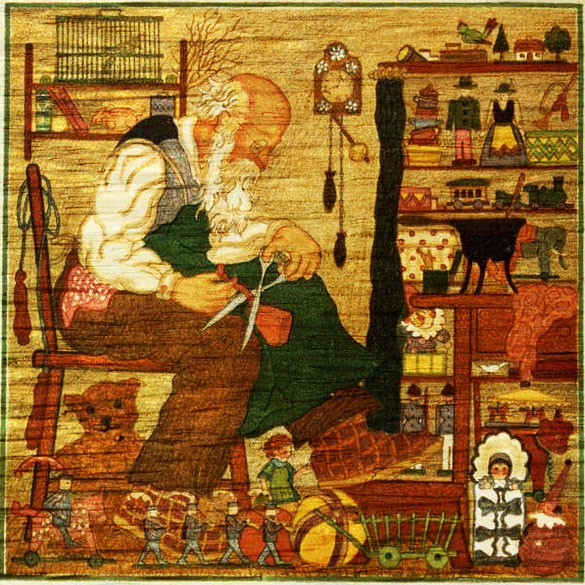I can see by the way you’re looking at him that there is a sense of resentment, but let me assure you that you’re misunderstanding the situation. You probably think that he’s doing this for a public relations reason, but unfortunately that’s not it at all.
Here – take a look at this picture. Notice the way the man looks at his student? Those adoring eyes, the sweet embrace and tender smile, he wouldn’t do that to someone he didn’t care for deeply. You see these two individuals use to know one another long before this man ever established a name for himself.
Let me explain.
Look out the window. See the man, who now sits on the curb before you, has faded like the very jeans that shelter his lower limbs, his tattered shirt soaked in sweat, and his dirty skin that reeks of odor, was once a famous musician. One might even suggest he still is, though he now refuses to play. You might find it difficult to believe this, but that same man is Wes Campbell. Yes, the Wes Campbell.
His melodies once resembled those like Johnny Cash and yet his compositions were considered richer, better. Rooted with choruses that created a window describing sweet dreams and cruel disappointments of life – The man once screamed to a crowd, “Ol’e Whiteman didn’t know it at the time, but he wrote about me once.” The crowd continued to admire the musician’s words by delivering whistles and boisterous cheers. He continued with, “I am the epitome of ’Song of myself.’ You’d just have to hear my story to believe it.”
He was never easy to get along with. In fact, Campbell would become passionate, even livid, during discussions of what made a good song. I once heard he almost crippled a reporter who tried to explain that writing music was “immature” and so simplistic an idiot could do it. It wasn’t until a few drinks rendered his ability to hold his emotions properly did he confess that the reporter was his son. A bitter son; he had left thirty years ago and not once accepted his existence. I could tell Campbell was pained by guilt from how his hand would quiver with each spoken word.
There was even an incident regarding a journalist who questioned him where music came from. The musician turned and delicately whispered, “Life unfortunately, the harder it is – the better the song. God must want me to write a damn gospel with the ghosts that haunt me.”
You might be wondering about the student I mentioned earlier. Well, he was a child of good fortune. Gifted by writing with a musical ear, he took piano lessons at the age of four and guitar at thirteen. The adolescent was raised in New York and spent summers running through the city. At night his room was full of crumpled balls of paper, like little white roses, which peppered the floor around the waste basket. His hours of composing music would collide with moments of lost inspiration.
He decided nothing was more daunting than a blank page staring back at him, daring him to mark its surface, mocking his ability. Although, with such a rare gift, by the time he was a high school senior, the boy played concerts to an audience that paid to listen.
How did the two meet? Well, the young boy, now a twenty-something man, went to college. He chose a certain University due to Campbell teaching a special class every spring semester. The two met in his office when the boy went to ask for advice, and they fit like a glove. Campbell admired him for his technical prowess and the student complained that his experiences in life rendered his ability to feel what he was playing.
I recall Campbell’s office vividly. The olive green walls spoke of recollections, a blue couch sat against the corner, and the smell of cigars and peanut butter stained his furniture.
He had an old rustic desk that embodied scars from age. There were neatly stacked papers to the right corner of it, a small bible and the left contained pictures of him in performance. Campbell once claimed pictures were the root of inspiration, for if one could see how they look on stage then there is always motivation to feel that rush again. I’m not sure if I agreed with that same sentiment, but I did become attached to his small world.
I remember that same olive color made up the University’s recital hall, and Campbell would hold lectures in that space. At first glance, he appeared to be arguing, but if you listened, you realized that he was discussing the minutest details of his pieces, just filled with this animated passion. Details of phrasing, the composer’s intent, the historical context of the composition; our discussions of the art were always full of intensity.
Maybe that matter is irrelevant. However, things do change. The young man’s career was starting to take off in the very place he’d least expect. Summer was beginning to blossom its sweltering haze, ending Campbell’s semester. And as his works came to be performed, his character changed. He became more irascible, and more convinced that people did not understand his work, or so he argued.
My first inkling that something was wrong came during what I describe as a strange interaction between him and a young fan. The cute admirer had big blue eyes, round rosy cheeks, and hair twisting around her necklace. She couldn’t have been much older than the age of twenty. The girl simply complimented him on the beauty of his playing and he thanked her for the kind words. As she continued to account what moved her, he became misty-eyed – and couldn’t continue the discussion. I was not prepared for what was to happen next.
After she walked away, he turned to me with bewildered eyes. I can not say if it was a look blemished with dismay or frustration. I handed him a Styrofoam cup filled with sweet whisky thinking it would help him gain a sense of composure. He followed with a sip and said, “They never seem to understand that when the music is moving, I can not be thanked – I am merely a technician at best. My heart is on the loose when my fingers pluck those strings. It is not within my control, much as I’d like to think it is.”
I figured the liquor had become a thorn in his side urging this humble disclaimer to brush his lips. But later I realized I was witnessing the start of a thought process which would dominate his one and only world.
He was troubled by melancholic overtones that, as he described, echoed off the floors and walls. Once, he asked that I didn’t sing miserable hymns any more for he could not bear to hear them. I think he had always been too sensitive for his own good. There were times, if someone criticized his music, he would take it to heart, as if it were an indictment of his character.
As I recall, the religious judgments started slowly. He had always bemoaned the fact that human nature wasn’t what it should be- that his colleagues walked around wallowing in their abstractions oblivious to the suffering that was going on around them.
At first he spoke of the need for people to get in touch with the principles that underlie religion. But I believe that his music is what had him drown in this psychotic madness.
One night he offended several people by declaring that most of his early performances were nonsense, and that his works inspired by God were the only thing worth listening too. Friends and family could only exchange disconcerted looks as his blood ran cold and his eyes took on a blank stare.
The musician began playing the piano more often and his stringed instruments less. I would talk to him, but even I wasn’t given a defined response. That night he left his loved ones with concern, I took the intoxicated Campbell back to his office. His body felt heavy as I laid him on the small couch and exhaustedly sat at his desk. My hands began to rub my face as I noticed the floor had stacks of loose paper intermixed with scriptures, each marked with red graffiti. The sight before me was disturbing and my heart was beginning to fall, “What have you been doing Wes?” was all I could say before a soft sneeze broke the moment.
It was after a performance, for which he played the piano, that I heard him say there had to be a God, and that his words were an expression of the Lord’s word, for no one could write something so moving unless he were directly inspired by a higher power. I expected Campbell to let a smirk tug his lips and let irony elevate, but no such image even flickered a resemblance.
Now, I know his argument sounds rather embellished, and I pointed that out to him, but his ear flushed a violent red and skin began to perspire. He said, “Descartes was merely referring to the idea of God, whereas he was referring to the feeling – the emotion, the pathos. I could not write music capable of evoking such deep emotion and reverence”, he said, “Unless divinely inspired.” At that moment, his eyes burned into mine and our voices crossed with provoked anger and confusion. That day I clearly remember I was losing my friend to something else.
Unfortunately, soon after, he stopped composing and declared he would perform only religious works. He became impossible to work with and even refused to take care of himself. His beard grew shaggy, he wore a hat to hide the oiled salt and pepper hairs, and always hid blood shot eyes with a pair of sunglasses. He argued with band members, stumbled on stage, and even wept openly during performances. At one point he confessed he no longer existed- that he was merely a medium for God to express himself.
His friends, those who stuck around, had suggested counseling, or a sabbatical–anything to break the cycle that had trapped him.
Though, it was after an autumn show that he finally broke down.
That night he was playing the guitar –it was actually used quite sparingly–I can still see his intensity as he sang the chorus during the first part. I caught a peaceful expression come over his face, as if something had clicked in his mind. I remember precisely the tenor recitative: “My Rum and Cigarettes, I’m so lonesome without you. This heart on my sleeve, left bleeding because of you. Jus this old love of mine soaks the floor, I’m so lonesome without you, that I stand here and burn in my skin.” Why this would ease his pain, I have no idea. Over time I have pondered that very moment to the point of fatigue. Though, I believe that night is when he said good bye to those who mattered, and a new Campbell emerged.
After his performance, we went outside to smoke a cigarette. We talked idly about the quality of instruments, future performances and such, and for a second, a hint of his old soul had returned. An energy that had not been witnessed for a very long time made his voice carry a youthful tone.
As he spoke about music, a beggar at the corner, a woman of 50 or so, quietly held forth an empty paper cup. Campbell gently touched my arm and said, “Look!” We watched for about thirty seconds as the departing concert-goers hurried by, lost in conversation, and then he looked at me with a strange, almost bemused expression, and said, “Not one! Not one person stopped and said anything to me! But they did stop to put money in that woman’s cup!”
Following this, he shook my hand, dropped a quarter in the woman’s cup, and walked away.
I certainly didn’t know it at that time, but I am told that he walked to his car, drove himself to the hospital, and had himself committed. Can you imagine that?
There, he was submitted and given antidepressants. He sat in his room, read only the Bible, and wept while playing his guitar. Please know that I visited him on one occasion, and he seemed weary. The fire was still gone from his eyes, replaced by what appeared to be a look of calm resignation. His psychiatrist, he told me, knew nothing of religion and even less of music. My friend had become thin, his cheeks had sunken. He stressed to me that his body ached from playing. When I asked if he would return to the University, he looked at me as a sympathetic father looks to his son. “I doubt I will,” was all he said.
After that meeting, I felt compelled to escape in Campbell’s office. I stood in the doorway for a long time. The early vestiges of sunlight were yet to be seen; moonlight filtered in through the glass at the far side of the room, painting a landing strip and coating everything a ghostly shade of silver. I caught a quick glance at the clock that confirmed it had only been eight hours since our conversation. The musician’s confession was carved on the walls as a token of who he had become. I was praying for a rewrite to the day’s previous scene, only knowing one was not forthcoming. I remember sighing as I fell into his chair. His drawers were empty, his pictures marked with scratches and yet, there was paper neatly stacked on the corner of his desk.
You see, I was stressed beyond belief and needed some form of outlet. I quickly grabbed a piece of paper and pen, only to begin the process of doing what I knew best – writing music. Before I knew it those little white roses were surrounding me in a space that I felt could be my own. I glanced around the drawers looking for more paper when I found a picture with Campbell and me. Surprised I began to observe it closer and when I turned it over a small yellow note fell. I opened it and smiled at the words, “Good Fortune Gavin – You are considered my weary note.”
Upon his release, he resigned from his position, and has, as you can see, taken to living on the streets. He refuses to play or write any music, saying that each individual must hear for themselves the melodies that God has planted in their hearts. Sometimes you might see him trembling a bit, but for the most part, he seems happy.
Even I, for the most part, severed ties with him, as we both became frustrated with our inability to communicate with one another.
You might wonder what happened to the young apprentice. Well, I must confess that I’m that student who is mentioned throughout this story. Though, I am neither young nor play concerts anymore. I simply teach and watch my friend dress like a beggar while he mumbles sweet nothings.
I now run the special music class that is only offered in the spring semester. And I tell this story to my students to show how a man, a musician, lost himself.
Why? The scene before us, I think, is less of sadness and one of beauty. That is all. He is a good man and deserves to have his story told.
—-
Amanda Todd is a freelance writer and illustrator. She specializes in taking words and using them in a creative composition. With sweet coffee nectar coursing through her veins, she is at constant battle with characters who affectionately bug her. A majority of the time, those buggers want a creative story written about them. Nonetheless, she loves to write, design and sketch. If you would like to reach Amanda you may do so at acwriter1985@hotmail.com.



